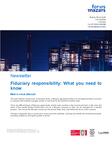
Fiduciary responsibility
What is a trust (fiducia)?
The word "fiducia" means trust. In business terms, a fiduciary agreement refers to an arrangement where a person or company (the trustee) manages assets or resources for the benefit of another party.
There are different types of fiduciary agreements, but the most common is the commercial trust. In this case, the owner of the assets (trustor) hands them over to a fiduciary company so they can be managed for a specific purpose. This means the fiduciary cannot use the assets freely; they must follow the terms of the contract.
Fiduciary companies play a crucial role in many economic activities, including real estate and investment projects, providing confidence among the parties involved.
Duties of Fiduciary Companies
Fiduciary companies must follow strict legal obligations to ensure the security of the assets they manage. Their main responsibilities include:
• Managing assets with diligence and transparency. They must act professionally and avoid any conflict of interest.
• Keeping trust assets separate from their own. This prevents them from being used for purposes other than those stated in the contract.
• Informing clients about risks and conditions. It is the trustee's duty to ensure that investors fully understand the terms of the contract.
• Protecting trust assets. The trustee must safeguard them from any threats, whether from third parties, the beneficiary, or even the trustor.
• Providing periodic reports. Trustees are required to present reports on how the assets are being managed.
Trusts in Real Estate Projects
One of the most common uses of fiduciary agreements is in real estate development. Real estate trusts are used to ensure that funds allocated for a project are handled securely and transparently.
When buying a property "off-plan", customers pay in advance before construction is completed. To minimize risks, many developers use fiduciary companies to manage these funds, ensuring that money is only released if specific conditions are met—such as financial viability and obtaining the necessary permits.
However, fiduciary companies must also verify that projects are solid and viable before agreeing to manage the funds. This includes checking for licenses, securing proper financing, and ensuring clear contracts with builders.
Specific Responsibilities of Fiduciary Companies
According to recent rulings by the Supreme Court of Justice (Decisions SC107-2023 and SC491-2024), fiduciary companies have the following key obligations:
• Providing information and advice: They must inform clients about risks, limitations, and negative aspects of the business before signing any contracts.
• Protecting trust assets: They must ensure assets are safeguarded from third parties, beneficiaries, and even the trustor.
• Acting in good faith and with loyalty: Fiduciary companies must avoid conflicts of interest and protect the interests of the trustor or beneficiary.
• Exercising diligence and professionalism: They must take all necessary measures to ensure the proper execution of the fiduciary business.
• Supervising and controlling projects: Particularly in real estate, trustees must verify permits, financial viability, funding sources, and the correct investment of resources.
When is a Fiduciary Company Liable for Damages?
If a fiduciary company fails to meet its obligations and causes harm to a beneficiary or investor, it may be held legally responsible for the damage. To establish liability, three key elements must be proven:
1.Negligence: The trustee acted carelessly or did not fulfil his duties.
2. Damage: The person affected suffered an economic or financial loss.
3.Causal link: The fiduciary’s failure was the direct cause of the harm suffered.
In general, the Supreme Court, through Decisions SC107-2023 and SC491-2024, has maintained a strict standard of fiduciary responsibility. Fiduciary companies must act with maximum diligence, as any failure may result in legal liability.
Protect Your Rights!
If you are experiencing an issue with a fiduciary company, it is essential to understand your rights and take action promptly. Our law firm is ready to advise and support you legally.
Contact us today to protect your investment with the help of experienced professionals.
Want to know more?


